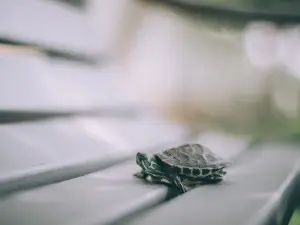
If you’re raising a turtle hatchling then you’re likely going to have to go through some troubleshooting when it comes to issues with feeding, like issues of your turtle not wanting to eat
This article looks into why your baby turtle may not want to eat
My baby turtle won’t eat:
Welcoming a new baby turtle into your home is the dream of many but this process isn’t always free from challenges, challenges like the little animal not wanting to eat.
This is what you need to know if your baby turtle is not interested in eating:
New environment:
If you’ve just brought your pet turtle into its new environment, your home, and the animal isn’t interested in eating then it’s only doing this because it doesn’t like change.
A turtle in a new environment may not eat for a week or two but it will get to eating once it feels more comfortable.
What to do:
Know that this is normal and natural and don’t worry, just keep leaving fresh food in your pet’s enclosure every day.
The animal will realize that you are not there to harm it and will approach and start eating the food.
Temperature:
Your baby turtle will not want to eat if its environment does not encourage eating, the animal’s temperature should be correct for it to want to eat.
These animals are cold-blooded and are affected in a big way by their environment
If it’s too cold in the enclosure then this won’t allow the animal’s body to regulate its metabolic rate, give it an appetite, and make it eat.
What to do:
Changing the temperature settings of your enclosure, to one that suits your turtle species’ needs, will get the animal’s body temperature up and make it want to eat.
Your pet doesn’t like the food:
Some turtles will be picky eaters, hatchlings included, they may not like to eat pellets and will rather sit and not eat.
This can be dangerous because this is the time that these animals really need to eat so intervening is a must
What to do:
Giving your pet variety when it comes to food should help, you can feed your pet live food and hope that it eats this.
These animals are more attracted to the strong smell of live food and prefer to eat live food, they are attracted to movement or live food as well, so offering the baby turtle foods like slugs, earthworms, snails, waxwork, crickets, and mealworms should help.
Illness:
If all of the above are not the cause of your pet’s lack of appetite then your pet may be ill.
Sickness in turtles, just as in humans, has the effect of affecting the appetite and this may be what’s happening with your turtle
What to do:
Your pet may be suffering from a number of turtle illnesses including constipation, respiratory infection, vitamin A deficiency, or eye problems.
You may only start to see signs of illness when the illness is quite far along so it’s recommended that you take your pet to the vet as soon as you see signs of illness.
If you don’t take your pet to the vet as soon as you can then your pet’s sickness will only get worse and worse and this may happen quite rapidly.
If you enjoyed this article then you may also be interested in other turtle/tortoise related articles. Here are some articles that you may be interested in: Why Are My Turtle’s Eyes Cloudy?, Why Are My Turtle’s Eyes White?, Why Is My Turtle’s Shell Turning Brown?, Why Is My Turtle Shell Chipping, Why Is My Turtle’s Shell Coming Off?, Why Is My Turtle Biting His Shell?, Why Is My Turtle Shell Turning Black?, Why Is My Turtles Skin Dry, Is My Turtle’s Shell Healthy?

